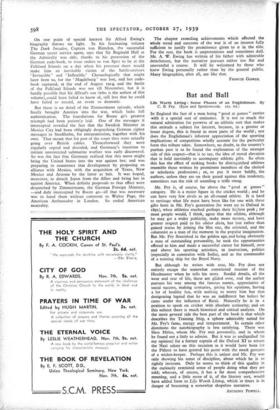Bat and Ball
IN England the fact of a man being " good at games " carries with it a special sort of eminence. It is not so much the natural admiration for prowess of an athletic sort that makes this attitude a subject for interest, because, in a greater or lesser degree, this is found in most parts of the world ; nor does the Englishman's inherent appreciation of the sporting implications of competition wholly account for the particular form this tribute takes. Somewhere, no doubt, in the country's puritan past is to be found the explanation of the stranger side of this respect—that is to say, the idea of moral elevation that is held inevitably to accompany athletic gifts. So often this has the effect of making books by distinguished athletes resemble those written by prominent members of the clerical or scholastic professions ; or, to put it more baldly, the authors, unless they are on their guard against this tendency, sometimes run the risk of sounding a trifle smug.
Mr. Fry is, of course, far above the " good at games " category. He is a major figure in the cricket world ; and he can have very few rivals as an all-round athlete. It is hard to envisage what life must have been like for one with these gifts born in Mr. Fry's generation (he went up to Oxford in 1891), when athletics reached perhaps their highest peak ; for most people would, I think, agree that the athlete, although he may get a wider publicity, make more money, and have greater respect paid to his obiter dicta, has lost rather than gained status by joining the film star, the criminal, and the columnist as a man of the moment in the popular imagination. But Mr. Fry flourished in the golden age, and being obviously a man of outstanding personality, he took the opportunities offered to him and made a successful career for himself, over and above his sporting activities, in journalism, politics (especially in connexion with India), and as the commander of a training ship for the Royal Navy.
But although he writes with ease, Mr. Fry does not entirely escape the somewhat constricted manner of the Headmaster when he tells his story. Sordid details, all the wear and tear of life, these are glided over, and the author pursues his way among the famous names, appreciative of social success, making centuries, giving his opinions, having a lot of healthy fun, with nothing to worry him but that denigrating legend that he was an indifferent bat before he came under the influence of Ranji. Naturally he is in a position to speak on cricket with absolute authority; and on this subject there is much historical and critical analysis. On the more general side the best part of the book is that which describes the Training Ship, a sphere admirably suited for Mr. Fry's fame, energy and temperament. In certain other directions the autobiography is less satisfying. There was Herr Hitler, whom Mr. Fry met personally, and in whom he found not a little to admire. But it was as undignified (in my opinion) for a former captain of the Oxford XI to return the Nazi salute on this occasion as it would have been for the Fiihrer to have greeted his guest with the mock gestures of a wicket-keeper. Perhaps this is unjust and Mr. Fry was only showing his sense of discipline, about which he is so rightly insistent. Only he seems to think of this quality in the curiously restricted sense of people doing what they are told; whereas, of course, it has a far more comprehensive meaning, and a little more of it, of the literary sort, would have added form to Life Worth Living, which at times is in danger of becoming a somewhat shapeless narrative.
ANTHONY POWELL.








































 Previous page
Previous page